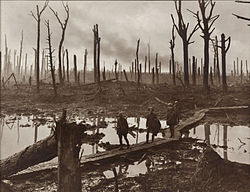
Back معركة باشنديل Arabic Üçüncü İpr döyüşü Azerbaijani Бітва пры Пашэндэйле Byelorussian Бітва пры Пашэндэйле BE-X-OLD Пашендейлска битка Bulgarian Emgann Passendale Breton Batalla de Passendale Catalan Třetí bitva u Yper Czech Brwydr Passchendaele Welsh 3.Ypres Danish
| Battle of Passchendaele (Third Battle of Ypres) | |||||||
|---|---|---|---|---|---|---|---|
| Part of the Western Front of the First World War | |||||||
 Australian gunners on a duckboard track in Château Wood, near Hooge, 29 October 1917. Photo by Frank Hurley. | |||||||
| |||||||
| Belligerents | |||||||
|
|
| ||||||
| Commanders and leaders | |||||||
|
Douglas Haig Hubert Gough Herbert Plumer François Anthoine Louis Ruquoy |
Erich Ludendorff Rupprecht of Bavaria Friedrich Sixt von Armin | ||||||
| Strength | |||||||
|
|
| ||||||
| Casualties and losses | |||||||
|
240,000–448,614 (disputed, see Casualties section) |
217,000–400,000 including 24,065 prisoners (disputed, see Casualties section) | ||||||
Passchendaele (Passendale) a Belgian village in the Zonnebeke municipality of West Flanders province. | |||||||
The Third Battle of Ypres (German: Dritte Flandernschlacht; French: Troisième Bataille des Flandres; Dutch: Derde Slag om Ieper), also known as the Battle of Passchendaele (/ˈpæʃəndeɪl/), was a campaign of the First World War, fought by the Allies against the German Empire.[a] The battle took place on the Western Front, from July to November 1917, for control of the ridges south and east of the Belgian city of Ypres in West Flanders, as part of a strategy decided by the Allies at conferences in November 1916 and May 1917. Passchendaele lies on the last ridge east of Ypres, 5 mi (8 km) from Roulers (now Roeselare), a junction of the Bruges-(Brugge)-to-Kortrijk railway. The station at Roulers was on the main supply route of the German 4th Army. Once Passchendaele Ridge had been captured, the Allied advance was to continue to a line from Thourout (now Torhout) to Couckelaere (Koekelare).
Further operations and a British supporting attack along the Belgian coast from Nieuport (Nieuwpoort), combined with an amphibious landing (Operation Hush), were to have reached Bruges and then the Dutch frontier. Although a general withdrawal had seemed inevitable in early October, the Germans were able to avoid one due to the resistance of the 4th Army, unusually wet weather in August, the beginning of the autumn rains in October and the diversion of British and French resources to Italy. The campaign ended in November, when the Canadian Corps captured Passchendaele, apart from local attacks in December and early in the new year. The Battle of the Lys (Fourth Battle of Ypres) and the Fifth Battle of Ypres of 1918, were fought before the Allies occupied the Belgian coast and reached the Dutch frontier.
A campaign in Flanders was controversial in 1917 and has remained so. The British Prime Minister, David Lloyd George, opposed the offensive, as did General Ferdinand Foch, the Chief of Staff of the French Army. Field Marshal Sir Douglas Haig, commander of the British Expeditionary Force (BEF), did not receive approval for the Flanders operation from the War Cabinet until 25 July. Matters of dispute by the participants, writers and historians since 1917 include the wisdom of pursuing an offensive strategy in the wake of the Nivelle Offensive, rather than waiting for the arrival of the American Expeditionary Force (AEF) in France.
Remaining controversial are the choice of Flanders, its climate, the selection of General Hubert Gough and the Fifth Army to conduct the offensive, and debates over the nature of the opening attack and between advocates of shallow and deeper objectives. Also debated are the time between the Battle of Messines (7–14 June) and the first Allied attack (the Battle of Pilckem Ridge, 31 July), the extent to which the French Army mutinies influenced the British, the effect of the exceptional weather, the decision to continue the offensive in October and the human costs of the campaign.
- ^ Edmonds 1991, p. iii; Sheldon 2007, p. xiv.
Cite error: There are <ref group=lower-alpha> tags or {{efn}} templates on this page, but the references will not show without a {{reflist|group=lower-alpha}} template or {{notelist}} template (see the help page).
© MMXXIII Rich X Search. We shall prevail. All rights reserved. Rich X Search
